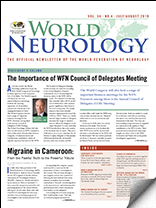By Alfred Kongnyu Njamnshi, MD, MA, DMS, FMH
In 2008, when then-president of the World Federation of Neurology (WFN) Prof. Johan A. Aarli set foot in Yaoundé for the 18th Congress of the Pan African Association of Neurological Sciences, (PAANS1), Cameroon—fondly referred to by its citizens as “Africa in miniature”2—was a peaceful, prosperous, powerful, and promising nation of the central African sub-region. At that time, there were only a handful of neurologists in Cameroon, and there was no training program for neurologists in the medical schools of the country.
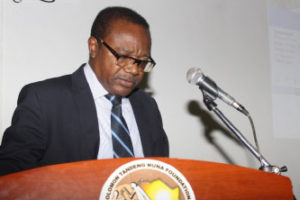
Dr. Mbome Njie Victor, representing the prime minister, delivers the speech at the closing ceremony on WBD.
In organizing this congress, a great need was felt to reach out for the preparation of future neurologists in the country. This was done through a pre-congress activity that consisted of selecting the best students from some primary, secondary, and university institutions in Yaoundé, introducing them to the neurosciences, and evaluating their performances after a short educational intervention on the epilepsies3.
Concerning this innovative program, Prof. Aarli had this to say: “The type of outreach program presented in Cameroon is important because it makes neurosciences not a foreign and exotic subject, but a part of their daily life and of public health.”1 On the congress proper, he reported, “I had the pleasure to attend the PAANS congress in Yaoundé, Cameroon, in November 2008 … The PAANS Congress served as an important information and discussion forum for African neurology. The meeting also was attended by local politicians and representatives from the government, which is essential in increasing the visibility of neurology.”4
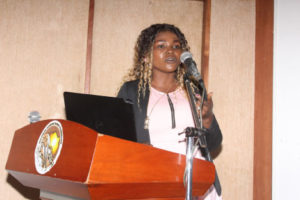
Dr. Edwige L. Mendo, neurologist trained in Cameroon and serving in the South region of the country, presenting the key message of the painful truth of migraine at the ST Muna Foundation on WBD.
The congress organizers had worked hard to convince the government of the Republic of Cameroon on the importance of neuroscience to national development. Indeed, this was the first time in the 36-year history of PAANS that the government of the host country was the unique sponsor of the entire congress. At the opening and closing ceremonies, several cabinet members accompanied the Vice Prime Minister H.E. Amadou Ali, the chair of the congress, which was held under the highly distinguished patronage of the president of the republic, head of state.
The primary theme of that congress was “The Epilepsies,” and the secondary theme was “Headaches.” It was attended by the then-president of the International League Against Epilepsy, Prof. Peter Wolf. The president of the International Headache Society could not attend due to a last-minute emergency. It was during this congress that Prof. Aarli challenged the government of Cameroon to start residency programs in the neurological sciences that could serve the country as well as the sub-region. This challenge was well received, and two years later, residency programs in neurology, neurosurgery, and psychiatry were established in the Yaoundé School of Medicine in the University of Yaoundé I. More details on the fruits of this development over the years shall be reported subsequently.
Currently, 11 neurologists (two from the Democratic Republic of Congo [DRC] and nine from Cameroon), five neurosurgeons, and six psychiatrists (one from DRC) have been trained in these programs. Also, our neurology department recently hosted a trainee neurologist from Belgium (now a practicing neurologist) for a period of six months5. It is worth noting that one of our youngest trainees just received his award as fellow of the European Board of Neurology on June 28, 2019, as the sole candidate from sub-Saharan Africa, following a tight examination in Oslo with his European counterparts and neurologists of other nationalities, in the international examination organized by the European Academy of Neurology.6
The Painful Truth
In recent years, however, the indescribable beauty of this young and healthy nation, like that of a young headache-stricken patient, has been significantly threatened and bruised by a series of crises that can be described by no other word than migraine, and that is the painful truth.
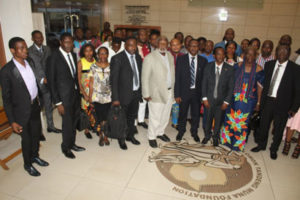
Closing ceremony group photograph with representative of the prime minister (4th), BRAIN Board Members (Pr Etya’ale Daniel, 1st , Pr Leke Rose 2nd) and president of ST Muna Foundation (Battonier Benard Muna, fifth from right, in front row)
Indeed, the pain has been throbbing, sparing no part of the country. First is the eastern tropical forest region of the country with the influx of refugees fleeing from their own internal crises in the Central African Republic and the multiple consequences thereof.
Second, more severe attacks have ravaged the western mountainous region of the Far North, spreading terror, panic, and chronic phobia in the populations.
Third, as if this were not enough, for the past three years, the North-West and the South-West regions of the country are the theater of a hemorrhagic conflict, and the populations of these two regions have been victims of uncountable, painful, persistent, and pervasive attacks, sometimes caught as it were between the hammer and the anvil.
The full extent of the reality of this extremely painful truth has not been and may never be adequately measured, but one thing is certain: the nausea and emesis accompanying the atrocities, the photophobia and sonophobia associated with the increasingly sophisticated firearms, will have long-lasting and far-reaching consequences on brain health and on health and development in general. It is disheartening to note that two-year-old internally displaced children are familiar with and easily recognize the sound of firearms.
You may be tempted to observe that what appeared to be a simple migraine aura, rapidly and unexpectedly developed into a hemiplegic migraine with one whole side of the nation completely paralyzed intermittently through the “ghost-towns,” then to chronic migraine or better still “chronic hemiplegic migraine.” The prevailing situation could best be described as a “chronic familial hemiplegic migraine” as many family members of the people of this one-time peaceful nation are now directly or indirectly affected.
The painful truth is that every part of the whole is seriously hurting. The migraine crisis in Cameroon, which is the most common crisis in the country, has severely impacted every aspect of national life and has been underrecognized, underdiagnosed, thus underresearched, and undertreated (crisis-treatment) despite many laudable efforts.
The country has become peaceless and sleepless, running short of its prosperous and promising nature. Land of promise, where is your promise? Land of glory, where is your glory? Nevertheless, together as a TEAM (Together Each Achieves More), we all can use our brains to make sure that the suffering brains and bodies of the people in Cameroon affected by this migraine receive the help they need as the key messages of the World Brain Day7 2019 suggest to become once again a peaceful and prosperous land of promise and glory.
May I remark in passing, but seriously so, that the migraine in Cameroon is not unique to Cameroon. Although some of the aggravating factors of these migraines generally tend to be environmental, not easily lending themselves to intrinsic control mechanisms in the context of a total absence of biofeedback mechanisms, it would appear that only a concerted, concentrated, and constant effort for lasting prophylactic solutions, coming from the ingenuity and strong will of endogenous healthy brains, will be effective.
This would involve a deliberate, directed, and delicate mix of multiple neuronal networks, that work together in synchrony and symphony, in promoting brain health and through brain health, promoting health at large as there is no health without brain health. To ensure success in this endeavor, in terms of effective and efficient neurophysiological mechanisms especially neurotransmission, neuromediation, and neuromodulation, this approach may also involve neuroepigenetics as we are dealing here with a migraine. This process, in itself is not pain free.
The Powerful Tribute: The novel concept of the “Brain Week in Cameroon”
In the midst of this deeply rooted pain and mounting pressure, Brain Research Africa Initiative (BRAIN) has chosen to hope for peace and to work for peace in this fatherland of Cameroon. Since inception by the WFN, we in Cameroon have always celebrated the World Brain Day (WBD) but this was generally limited to an academic or professional audience. This year, BRAIN created the concept of the “Brain Week in Cameroon” involving five main BRAIN activities beginning from a week before the WBD and climaxing with the celebration of the WBD. The goal was to have a nationwide campaign of:
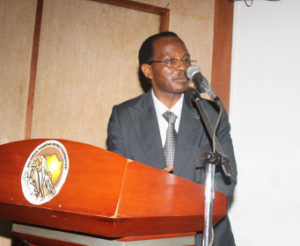
Alfred K. Njamnshi, founder and executive director of BRAIN, delivering the inaugural Monekosso-Muna BRAIN Lecture: The Foundations of Neuroscience Research in Cameroon and Africa.
- Bringing BRAIN health closer to the populations (diagnosing and treating disease in sick brains)
- Raising BRAIN awareness among the populations (sensitizing healthy brains to remain healthy)
- Activating BRAIN networks with the institutions (building partnerships for brain health)
- Increasing BRAIN capacity in the professionals (training through professional education)
- Nurturing future generations of BRAIN professionals (celebrating excellence to generate interest in neuroscience careers among the youth).
The inaugural “Brain Week in Cameroon” ran from July 15 to 22, 2019, under the distinguished patronage of the Prime Minister, Head of Government, Chief Dr. Joseph Dion Ngute and in partnership with the government of Cameroon.
First, free neurology, neurosurgery or psychiatry consultations in regional or tertiary health facilities took place in seven of the 10 administrative regions of the country (including some of the migrainous regions), thus bringing brain health care closer to the populations.
Second, multimedia sensitization talks, workshops, and symposia were carried out to raise brain awareness and the national communication media had at least a nationwide audience.
Third, the first two activities provided a forum for networking and building partnerships for the promotion of brain health. Specific public-private partnership agreements were also established between state and private institutions.
Fourth, with the participation of state universities, academic symposia were conducted in two faculties of medicine to increase the capacity of medical students, physicians, and other health personnel in the management of brain disease, particularly migraine.
Finally, a general symposium was conducted in the nation’s capital city of Yaoundé on primary headaches, with special emphasis on migraine, and the icing on the cake was the establishment of the novel concept of “The Monekosso-Muna BRAIN Lecture,” in honor of and as a tribute to the founding fathers of Cameroonian and African neuroscience research.
The late Prof. Gotlieb Lobe Monekosso employed field epidemiological and clinical approaches in the 1960s in Nigeria to study what was variably called at that time, endemic neuropathies, degenerative tropical neuropathies, tropical nutritional neuropathy, or tropical ataxic neuropathy while late Prof. Walinjom FT Muna since the 1990s set the pace for clinical research on HTLV-associated myelopathy, stroke, neuroAIDS, and the epilepsies in Cameroon.
The Monekosso-Muna BRAIN Lecture celebrates excellence in neuroscience and aims to stimulate and attract the young generations to consider taking up careers in neuroscience.
The theme of Brain Week in Cameroon 2019 was, “Promoting Brain Health and Conflict Resolution,” and the core messages highlighted the fact that we all need healthy brains, free from drugs and disease, in healthy bodies, for rational use in dialogue, constructive communication, and negotiations, and to resolve interpersonal, intergroup, or even international conflicts. Thus, BRAIN has attempted to extend and contextualize the WFN concept of “World Brain Day” to the concept of “Brain Week in Cameroon.”
Most of the activities of Brain Week in Cameroon were carried out by or under the leadership of brain health specialists or experts trained in Cameroon and serving in the different regions of the country, some of them under extremely difficult conditions. BRAIN received the partnering support of public and private media agencies as well as some private health institutions in this endeavor. Brain Week in Cameroon has come to stay and to grow, and the Prime Minister of Cameroon, writing on brain health, has encouraged BRAIN to “continue to sensitize the government and other partners on this important aspect of human health.”
The Way Forward
BRAIN, in partnership with the Cameroon Government, has chosen to light a candle, rather than curse the darkness of the migraine in Cameroon through the celebration of Brain Week in Cameroon and World Brain Day. BRAIN plans to cover all of the 10 administrative regions of Cameroon in the next edition of Brain Week in Cameroon and World Brain Day and to consolidate and spread this concept and strategy for the promotion of brain health in the region.
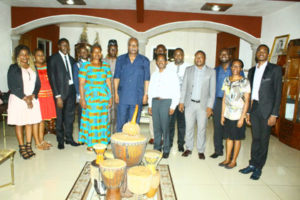
Past prime minister and board chair of BRAIN, H.E. Philemon Yang (center), took time off to attend a reception on WBD. He congratulated and encouraged the young BRAIN leaders from the seven regions of Cameroon to continue to work for brain health with courage, determination, and patience.
Since it has been said that every cloud has a silver lining, BRAIN hopes that the WFN and other partners such as the World Brain Alliance will find an interest in supporting BRAIN in its vision and mission so that as a team, we can work together toward the preventive treatment of the migraine in Cameroon, Africa, and the world, thus promoting brain health. •
Readers should note that articles in World Neurology represent the opinions of the author and not necessarily the view of the World Federation of Neurology.
Alfred Kongnyu Njamnshi, MD, MA, DMS, FMH is professor of neurology and neuroscience, faculty of medicine and biomedical sciences at the University of Yaoundé I, (FMBS-UYI), Yaoundé, Cameroon. He is also the founder and executive director of the Brain Research Africa Initiative (BRAIN), Geneva, Switzerland, and Yaoundé, Cameroon. He is head of the neurology department at the Yaoundé Central Hospital, chair of neurology-neuroscience training programs and head of the neuroscience lab, FMBS-UYI, and past president of PAANS, WFN delegate for Cameroon and emeritus regional director for Africa of the World Federation of Neurology.
References
- Schneider ME. PAANS: Reaching out to future neurologists, Success seen in African outreach. World Neurology, vol. 24, No. 1 February 2009, pp1 &4. www.wfneurology.org
- Johnson-Hanks J. Education, Ethnicity, and Reproductive Practice in Cameroon Population 2003/2 (Vol. 58) DOI : 10.3917/popu.302.0171 Pages 153 – 179.
- Akinyemi R, Yepnjio F, Njamnshi AK. Neuroscience in Africa: raising the next generation and changing attitudes towards epilepsy: IBRO (2008) brain campaign funds Pre-PAANS congress 2008, Yaoundé, Cameroon. http://www.braincampaign.org/Pub/Pub_Main_Display.asp?LC_Docs_ID=3740 (accessed December 5, 2008).
- Aarli JA, The President’s annual report: Outreach and Exchange. World Neurology, vol. 24, No. 1 February 2009, pp6. www.wfneurology.org
- Naeije G, Yepnjio FN, Bissek AC, Tabah EN, Tatah G, Fonsah JY, Fogang Y, Kuate C, Dachy B, Njamnshi AK. Yield of training exchanges between Europe and Sub-Saharan Africa. Acta Neurol Belg. 2013 Mar; 113(1):31-4.
- Brain Research Africa Initiative, BRAIN has a new Fellow of the European Board of Neurology, https://brainafrica.org/brain-has-a-new-fellow-of-european-board-of-neurology 2019.
- World Federation of Neurology, World Brain Day 2019, Migraine: The painful truth. https://www.wfneurology.org/world-brain-day-2019.
